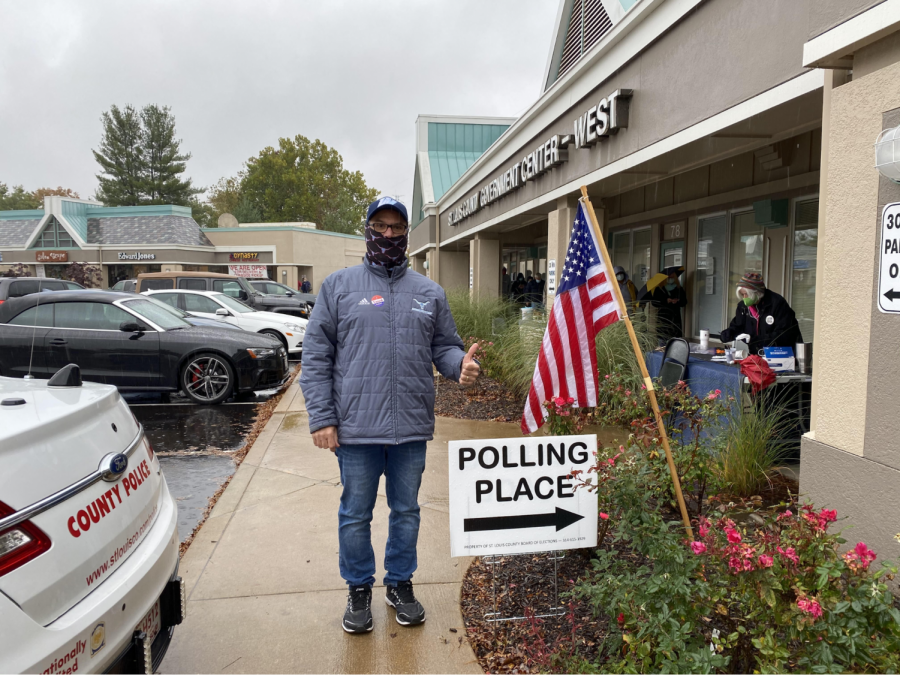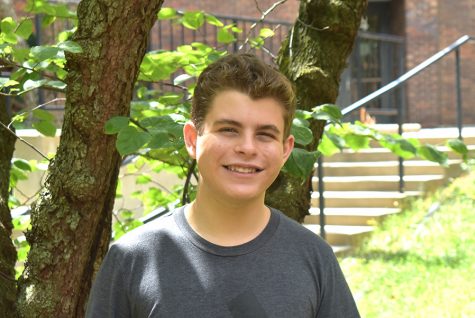As the 2020 election season comes to a close, students and faculty alike are preparing to vote on Nov. 3. This is seniors’ first time at the ballot, and for teachers, their first time voting during a pandemic.
Senior Bri Davis turned 18 just a few days before the election. This is her first time voting.
“If I’m being honest, I have always wanted to vote,” Davis said. “I’m a huge person when it comes to using your voice for positive things.”
Davis says that this election is beyond politics.
“There are so many things to think about in this election. Not only with Donald Trump, but also with Joe Biden. You genuinely have to sit there, think about it, and make the right decision. It’s, in my opinion, a really strong and serious election,” Davis said.
The Black Lives Matter movement, which reignited this summer, is what pushed Davis to vote.
“My mom says that everything that has happened to us in history [was] so we could do what we’re able to do today. When the Black Lives Matter movement happened, I was like ‘something needs to be done,’” Davis said. “The Black Lives Matter movement really struck me in the head and was like ‘you need to vote.’”
Senior Gaby Jez is still making up her mind whether or not she will be voting. Jez says that voting is a deeply personal matter and should be thought out.
“I’m still not sure if I’ll be voting this year. I’ve been watching the news closely. I do have a candidate in mind, I’m just trying to decide if I want to vote or not,” Jez said. “Deciding to vote is a personal choice, and that choice takes a lot of time to decide. It’s still in the air if I want to vote or not. I need to find out the candidates’ ultimate goals and how they would help our country. I just need to find out more information about the candidates.”
Candidates are not the only thing in this election that need to be pondered. Students and teachers are both weighing the pros and cons of voting in-person or voting by mail. Davis says that voting in-person will create a mutual experience with her, her mother and her community.
“I was going to mail [my ballot] first, because I was too scared of COVID-19, but then I just felt like voting in person. Going to the polls will have more of an impact on me, personally. I’ll be getting that physical experience whether I’m wearing a mask or not,” Davis said.
Davis’ mom, being a court clerk, encouraged her to get educated on the candidates and issues surrounding the upcoming election.
“I look on social media and sometimes I’ll read articles, but I mainly get it from my mom. She’s like, ‘you need to know about these things,’” Davis said.
Teachers are also weighing the benefits of voting in-person. English teacher Kim Hanan-West has been vigilant regarding COVID-19 precautions. However, the virus will not hold her back from going to the ballot box in person.
“I’m very concerned that there will be opposition to the mail-in ballots,” Hanan-West said. “I feel that it is very important in this election that, if you can mask up, to vote in person.”
Voting is a family tradition for Hanan-West. She loves to exercise the right that past suffragettes and her family fought for.
“My grandmother was born in 1909, and at that time women didn’t have the right to vote. My family always took voting very seriously. They voted in local, state and federal elections. That tradition stuck with me, and I think about how women didn’t have the right to vote 100 years ago,” Hanan-West said.
Hanan-West references “The Soul of America,” a new documentary on HBO. She believes that Jon Meacham perfectly encapsulates the struggle that our country is going through.
“Historian Jon Meacham said that America prospers when we appeal to our better angels and our more moral tendencies. For me, this is an existential election where I feel the need to vote for a candidate who will appeal to our better angels and help us prosper,” Hanan-West said.
While Hanan-West is an English teacher, she still considers herself a student of literature. Her readings have influenced her political identity and love of politics.
“I’ve studied speeches, documents and historical pieces for both their literary merit and impact on history. I’m interested in politics because it has direct bearing on our future,” Hanan-West said.
Education is a policy that influences how Hanan-West votes.
“Education has really borne the brunt of the impact of the pandemic,” Hanan-West said. “I feel like education is one of those things that’s really deeply embedded into the promise of America and the idea of the American dream. In order for anyone to achieve life, liberty or to pursue happiness, they need access to a quality education.”
As someone with family members who are vulnerable to COVID-19, Hanan-West will be taking many precautions at the ballot box.
“I always mask. I have a face shield, so I’ll wear that. As soon as I leave, I have my hand sanitizer and as soon as I get home, I’ll use soap and water,” Hanan-West said.
History teacher Jim Hermann votes in every election, but this will be his first time voting absentee.
“I decided to vote absentee this year because of COVID. It was easy. Thirty minutes in and out with incredibly friendly workers,” Hermann said.
Students and faculty, voting or not, believe that this election will shape our country for years to come.
“It’s so much more important because the stakes are higher,” Davis said, “It’s a happy feeling because I get to use my voice. I finally feel represented.”




![Smiling in a sea of Longhorns, Fox 2 reporter Ty Hawkins joins junior Darren Young during the morning Oct. 3 pep rally. The last time West was featured in this segment was 2011. “[I hope people see this and think] if you come to [Parkway] West, you will have the time of your life because there are so many fun activities to do that make it feel like you belong here. I was surprised so many people attended, but it was a lot of fun,” Young said.](https://pwestpathfinder.com/wp-content/uploads/2025/10/Edited2-1200x798.jpg)
![West High seniors and families listen as a representative of The Scholarship Foundation of St. Louis, Teresa Steinkamp, leads a Free Application for Federal Student Aid (FAFSA) workshop. This session, held in the library, provided guidance on financial aid, scholarships and student loan options. “This event is very beneficial for any seniors who are applying to or considering applying to colleges after high school [because] the cost of college is on the rise for seniors and parents,” college and career counselor Chris Lorenz said.](https://pwestpathfinder.com/wp-content/uploads/2025/09/DSC_4478-1200x778.jpg)
![Senior Kamori Berry walks across the field during halftime at the Homecoming football game on Sept. 12. During the pep assembly earlier that day, she was pronounced Homecoming Queen. “I thought it was nice that the crowd [started] cheering right away. I know [my friends] were really excited for me, and my family was happy because typically non-white people don't win,” Berry said.](https://pwestpathfinder.com/wp-content/uploads/2025/09/DSC7046-Enhanced-NR-1200x798.jpg)



![Pitching the ball on Apr. 14, senior Henry Wild and his team play against Belleville East. Wild was named scholar athlete of the year by St. Louis Post-Dispatch after maintaining a high cumulative GPA and staying involved with athletics for all of high school. “It’s an amazing honor. I feel very blessed to have the opportunity to represent my school [and] what [it] stands for,” Wild said.](https://pwestpathfinder.com/wp-content/uploads/2025/05/unnamed-6-1200x714.jpg)
![The Glory of Missouri award recipients stand with their certificates after finding out which virtue they were chosen to represent. When discovering their virtues, some recipients were met with contented confirmation, while others, complete surprise. “I was not at all surprised to get Truth. I discussed that with some of the other people who were getting the awards as well, and that came up as something I might get. Being in journalism, [Fellowship of Christian Athletes and] Speech and Debate, there's a culture of really caring about truth as a principle that I've tried to contribute to as well. I was very glad; [Truth] was a great one to get,” senior Will Gonsior said.](https://pwestpathfinder.com/wp-content/uploads/2025/04/Group-Glory-of-Missouri.jpg)

